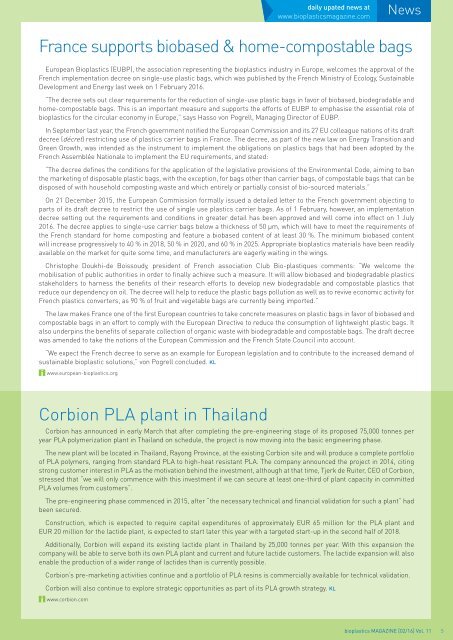Issue 02/2016
bioplasticsMAGAZINE_1602
bioplasticsMAGAZINE_1602
Create successful ePaper yourself
Turn your PDF publications into a flip-book with our unique Google optimized e-Paper software.
daily upated news at<br />
www.bioplasticsmagazine.com<br />
News<br />
France supports biobased & home-compostable bags<br />
European Bioplastics (EUBP), the association representing the bioplastics industry in Europe, welcomes the approval of the<br />
French implementation decree on single-use plastic bags, which was published by the French Ministry of Ecology, Sustainable<br />
Development and Energy last week on 1 February <strong>2016</strong>.<br />
“The decree sets out clear requirements for the reduction of single-use plastic bags in favor of biobased, biodegradable and<br />
home-compostable bags. This is an important measure and supports the efforts of EUBP to emphasise the essential role of<br />
bioplastics for the circular economy in Europe,” says Hasso von Pogrell, Managing Director of EUBP.<br />
In September last year, the French government notified the European Commission and its 27 EU colleague nations of its draft<br />
decree (décret) restricting use of plastics carrier bags in France. The decree, as part of the new law on Energy Transition and<br />
Green Growth, was intended as the instrument to implement the obligations on plastics bags that had been adopted by the<br />
French Assemblée Nationale to implement the EU requirements, and stated:<br />
“The decree defines the conditions for the application of the legislative provisions of the Environmental Code, aiming to ban<br />
the marketing of disposable plastic bags, with the exception, for bags other than carrier bags, of compostable bags that can be<br />
disposed of with household composting waste and which entirely or partially consist of bio-sourced materials.”<br />
On 21 December 2015, the European Commission formally issued a detailed letter to the French government objecting to<br />
parts of its draft decree to restrict the use of single use plastics carrier bags. As of 1 February, however, an implementation<br />
decree setting out the requirements and conditions in greater detail has been approved and will come into effect on 1 July<br />
<strong>2016</strong>. The decree applies to single-use carrier bags below a thickness of 50 µm, which will have to meet the requirements of<br />
the French standard for home composting and feature a biobased content of at least 30 %. The minimum biobased content<br />
will increase progressively to 40 % in 2018, 50 % in 2<strong>02</strong>0, and 60 % in 2<strong>02</strong>5. Appropriate bioplastics materials have been readily<br />
available on the market for quite some time, and manufacturers are eagerly waiting in the wings.<br />
Christophe Doukhi-de Boissoudy, president of French association Club Bio-plastiques comments: “We welcome the<br />
mobilisation of public authorities in order to finally achieve such a measure. It will allow biobased and biodegradable plastics<br />
stakeholders to harness the benefits of their research efforts to develop new biodegradable and compostable plastics that<br />
reduce our dependency on oil. The decree will help to reduce the plastic bags pollution as well as to revive economic activity for<br />
French plastics converters, as 90 % of fruit and vegetable bags are currently being imported.”<br />
The law makes France one of the first European countries to take concrete measures on plastic bags in favor of biobased and<br />
compostable bags in an effort to comply with the European Directive to reduce the consumption of lightweight plastic bags. It<br />
also underpins the benefits of separate collection of organic waste with biodegradable and compostable bags. The draft decree<br />
was amended to take the notions of the European Commission and the French State Council into account.<br />
“We expect the French decree to serve as an example for European legislation and to contribute to the increased demand of<br />
sustainable bioplastic solutions,” von Pogrell concluded. KL<br />
www.european-bioplastics.org<br />
Corbion PLA plant in Thailand<br />
Corbion has announced in early March that after completing the pre-engineering stage of its proposed 75,000 tonnes per<br />
year PLA polymerization plant in Thailand on schedule, the project is now moving into the basic engineering phase.<br />
The new plant will be located in Thailand, Rayong Province, at the existing Corbion site and will produce a complete portfolio<br />
of PLA polymers, ranging from standard PLA to high-heat resistant PLA. The company announced the project in 2014, citing<br />
strong customer interest in PLA as the motivation behind the investment, although at that time, Tjerk de Ruiter, CEO of Corbion,<br />
stressed that “we will only commence with this investment if we can secure at least one-third of plant capacity in committed<br />
PLA volumes from customers”.<br />
The pre-engineering phase commenced in 2015, after “the necessary technical and financial validation for such a plant” had<br />
been secured.<br />
Construction, which is expected to require capital expenditures of approximately EUR 65 million for the PLA plant and<br />
EUR 20 million for the lactide plant, is expected to start later this year with a targeted start-up in the second half of 2018.<br />
Additionally, Corbion will expand its existing lactide plant in Thailand by 25,000 tonnes per year. With this expansion the<br />
company will be able to serve both its own PLA plant and current and future lactide customers. The lactide expansion will also<br />
enable the production of a wider range of lactides than is currently possible.<br />
Corbion’s pre-marketing activities continue and a portfolio of PLA resins is commercially available for technical validation.<br />
Corbion will also continue to explore strategic opportunities as part of its PLA growth strategy. KL<br />
www.corbion.com<br />
bioplastics MAGAZINE [<strong>02</strong>/16] Vol. 11 5


















